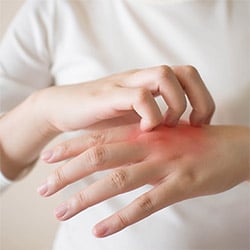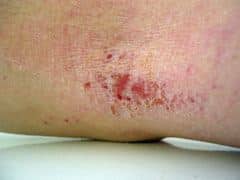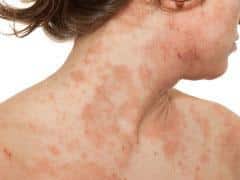What Is Eczema?
Eczema is the term we commonly use for the skin condition known as atopic dermatitis and other similar itchy, flaky skin rashes. The hallmarks of eczema are redness and dry scaly appearance of the skin with associated itching. Severe forms of eczema may also cause peeling, blistering or oozing of the skin. While eczema usually affects the insides of elbows and knees or the face, it may occur anywhere on the body. The childhood form of eczema known as atopic dermatitis typically starts before the age of 2 but adult forms of eczema may start at any age.

Unfortunately, the underlying cause of eczema is difficult to diagnose. Atopic dermatitis, the childhood form of eczema, usually has familial predisposition which increase the person’s risk of developing eczema. There is also association with asthma, hay fever and allergies. However, while patients with eczema may have higher risk of allergies, the patient’s allergies do not cause their eczema, but may cause flares. While the specific cause can be challenging to identify, some common triggers of eczema include:
- Irritants like soaps, disinfectants or juices
- Allergens such as dust mites, pets, pollen, mold, or dandruff
- Microbes including bacteria, viruses, and fungus
- Extreme temperatures
- Food allergens
- Stress and hormones
- Dry skin


What Treatments Are Available?
The providers at Skin & Beauty Center consider each patient’s case individually and create customized treatment plans to specifically address the unique concerns and symptoms for each patient. While each patient receives individualized care, there are some common themes of treatment. For example, we generally recommend a regular skin care regime involving gentle soap-free cleansers and a good moisturizer to keep the skin hydrated. We also recommend certain lifestyle changes to maintain your overall health with a balanced diet, regular exercise and hobbies that help to reduce stress can help to manage outbreaks. It is helpful to keep track of any factors associated with triggers of your eczema so those can be avoided to prevent future flares. Your physician may also prescribe topical anti-inflammatory medications such as corticosteroids or calcineurin inhibitors to reduce the itch and rash associated with an outbreak. In some instances, phototherapy or excimer laser therapy might also be helpful, both of which help to reduce itch and inflammation, increase vitamin D production and bacteria fighting cells in the skin. Finally, there are several oral medications used in severe, persistent forms of eczema. These include the recently FDA first targeted biologic therapy for atopic dermatitis called Dupixent. Your physician will determine whether you an appropriate candidate for any of the above mentioned therapies. While there is no cure for eczema, the proper individualized skin care regimen and medications will greatly reduce severity of eczema.

